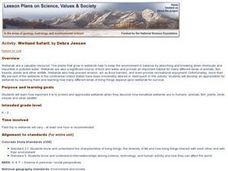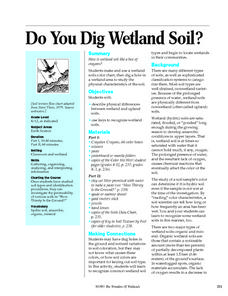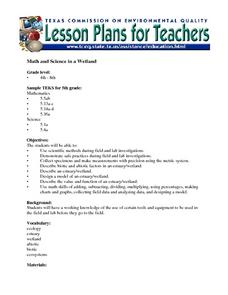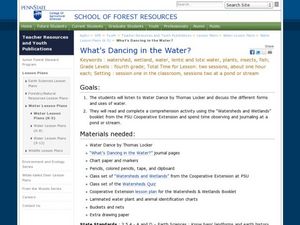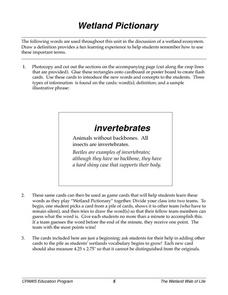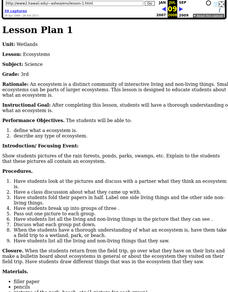Curated OER
Investigating comparative biodiversity of wetland and schoolyard sites
Fourth graders participate in an activity dealing with the environment.
Curated OER
Sounds of the Wetlands
Students identify the sounds of different bird calls. In this biology lesson, students create a sound map. They explain how this method is important in tracking wildlife.
Curated OER
Wetlands Project
Students discover how wetlands filter out contaminants before they can reach other bodies of water. In groups, they design and build a model of a stormwater wetland. They test the water quality and inform their classmates about the...
Curated OER
Wetland Safari!
Students identify how humans, fish, plants, birds, insects and other wildlife benefit from wetland environments. They observe a wetland and its inhabitants, draw a migration map that represents how birds use wetlands in traveling long...
Curated OER
Do You Dig Wetland Soil?
Students study the physical differences between wetland and upland soils. They match colors to the different levels of the soil after digging holes. They create soil color charts and chart the texture of the soils.
Curated OER
Arkansas and Louisiana Purchase Wetlands
Students experiment to determine the value and importance of wetlands in Arkansas. They develop an environmental appreciation for wetlands.
Curated OER
If You Mess With A Wetland, At Least Try to Make Amends!
Eighth graders examine the role of wetlands in an ecosystem. In groups, they use the internet to research how humans have disturbed and ruined the effectiveness of wetlands throughout the country. They pretend they are in charge of...
Curated OER
Math and Science in a Wetland
Students describe safe practice when doing field and lab investigations in a estuary or wetland. They create a model of an estuary and describe their value and function. They participate in field study in which they collect and analyze...
Curated OER
Hurricanes and the Importance of Wetlands
Students explain how wetlands minimize the impact of hurricanes. In this earth science lesson plan, students investigate how different materials affect the steam plume path. They complete their worksheet after the lab.
Curated OER
Wetlands/Watershed Model
Students make a model that will demonstrate the flow of surface water across the land in Texas and how materials that originate many miles away can end up in the wetland along the coast.
Curated OER
Wetlands/Watershed Model
Pupils work together to create a watershed model. They discover the flow of surface water on different topography. They examine how materials originate from miles away and end up in a different wetland.
Curated OER
Pond Ecology
A lab activity is a great way to incite thoughtful questioning and scientific processes. Pupils will collect organisms with a Petri dish, make observations, sketch the organism, ask questions, then attempt to identify the specimen...
Curated OER
Impervious Surfaces
Young scholars comprehend impervious surfaces. They recognize the problems caused by impervous surfaces. Students observe how land use can influence impervious surfaces. They chose four of the seven basic land surface, young scholars...
Curated OER
WET Science Lesson #5: Pass the Salt Please! (How Road Salt Affects Wetlands)
As an anticipatory set, biologists listen to the story of Ruth Patrick, a scientist who used algae to detect water quality. They observe a demonstration of osmosis and diffusion. In their lab groups, they place Elodea stalks in...
Curated OER
Bird airport control
Students identify the various species of birds found in the wetlands. Students observe and record the key skills involved in scientific inquiry. Students handle and interpret data gathered on a field trip which reveals patterns and...
Curated OER
Marshland Wonders
Students review the characteristics of wetlands and list their benefits. After viewing short videos, they identify the organims that make their home in wetlands and how they have adapted. They compare and contrast the characteristics...
Curated OER
What's a Swamp Good For?
Students identify the function and value of wetlands. In this activity on appreciating wetlands, students explain how different household items can represent different aspects of the wetlands.
Curated OER
What's Dancing in the Water?
Students learn about watershed, as well as the different forms and uses of water. In this water forms lesson, students brainstorm water sources and uses. Students read the book Water Dance and discuss water examples. Students complete a...
Curated OER
Stream
Students examine stream waters. In this scientific inquiry lesson, students "explore" wetlands as they participate in a demonstration that reveals information about steam waters and insects.
Curated OER
Marsh March
Students investigate natural organization of a wetland and the interrelationships between the wetland and the surrounding environment.
Curated OER
Wetland Pictionary
Students create a game for reviewing vocabulary. They make cards with definitions of the words. Then the cards are used to play the game of Pictionary or a modified game. The teacher could have the students generate their own game in...
Curated OER
Annual Wetland Plant Diversity Survey
Learners locate an area of marsh and, by measuring the total number of individual plants in a sample area, determine whether purple loosestrife population density is correlated to the total plant diversity of the community. They...
Curated OER
Wetlands
Third graders examine how an ecosystem is a distinct community of interactive living and non-living things.
Curated OER
Math and Science in a Wetland
Students use scientific methods during field and lab investigations. Students collect specimens and make measurements using the metric system. Students describe biotic and abiotic factors in an estuary and design a model.
Other popular searches
- Louisiana Wetlands
- Animal Adaptations +Wetlands
- Animal Adaptations Wetlands
- Freshwater Wetlands
- Animals of the Wetlands
- Wetlands Water Cycle Diagram
- Watersheds and Wetlands
- Inland Wetlands
- Project Wetlands
- Wetland Soil Classification
- Wetlands Habitat
- Abc Book on Wetlands





